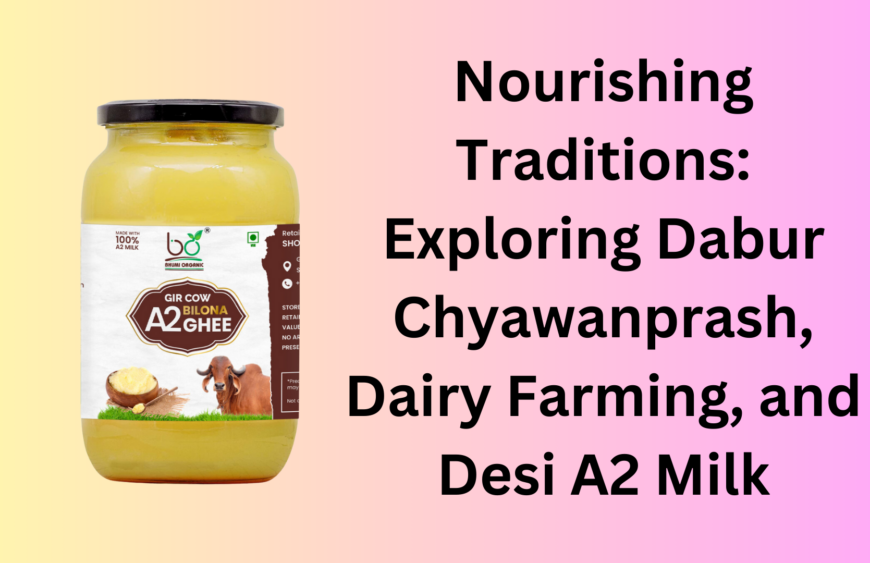Nourishing Traditions: Exploring Dabur Chyawanprash, Dairy Farming, and Desi A2 Milk

1. Dabur Chyawanprash: A Timeless Wellness Tonic
Dabur Chyawanprash stands out as a revered Ayurvedic formulation known for its holistic health benefits. It’s a concoction of potent herbs, spices, and natural ingredients like amla, ashwagandha, giloy, and tulsi, blended with aromatic spices such as cinnamon, cardamom, and clove. This amalgamation creates a powerhouse of nutrients, antioxidants, and immune-boosting properties.
The uniqueness of Dabur Chyawanprash lies in its ability to enhance overall well-being. It supports the immune system, aids digestion, improves respiratory health, and boosts vitality. Regular consumption of Chyawanprash is believed to promote longevity and strengthen the body’s defense mechanisms against infections and illnesses.
2. Embracing Dairy Farming: From Pastures to Products
Dairy farming is a complex yet rewarding agricultural practice that involves the rearing of dairy cattle for milk production. From sprawling pastures where cows graze freely to modern dairy facilities equipped with advanced milking technologies, the journey of dairy products begins. Ethical dairy farming emphasizes the well-being of cows, sustainable land management, and responsible resource usage.
Milk, the primary product of dairy farming, serves as the foundation for a range of dairy products like cheese, yogurt, butter, and ghee. Sustainable dairy practices prioritize animal welfare, minimize environmental impact, and ensure the production of high-quality, nutritious dairy items.
3. Desi A2 Milk: The Gold Standard of Dairy
Desi A2 milk, sourced from indigenous cow breeds like Gir, Sahiwal, and Red Sindhi, is renowned for its nutritional superiority. Unlike conventional milk, that contains both A1 and A2 beta-casein proteins, desi A2 milk predominantly contains the A2 variant. This composition is believed to offer benefits such as easier digestibility, reduced inflammation, and potential relief for lactose-intolerant individuals.
The demand for desi A2 milk has surged due to its perceived health benefits and rich, creamy texture. Consumers are increasingly seeking alternatives to mass-produced milk, valuing the traditional practices and nutritional richness associated with desi A2 milk.
4. The Science Behind Dabur Chyawanprash
Scientific studies have delved into the efficacy of Dabur Chyawanprash, validating its traditional use and health-promoting properties. Research indicates that Chyawanprash exhibits immunomodulatory effects, antioxidant activity, and potential anti-inflammatory properties. The synergistic blend of herbs and spices in Chyawanprash contributes to its overall health benefits.
Key ingredients like amla, known for its high vitamin C content and antioxidant capacity, play a crucial role in enhancing immune function and cellular health. Ashwagandha, another vital component, supports stress management and vitality. These scientifically backed benefits have solidified Chyawanprash’s position as a comprehensive wellness tonic.
5. Ethical Dairy Farming: Caring for Cows and the Environment
Ethical dairy farming revolves around responsible practices that prioritize animal welfare, sustainable land management, and environmental conservation. Practices such as rotational grazing, organic feed, and humane treatment of cows ensure their well-being while reducing the ecological footprint of dairy operations.
Sustainable dairy farms adhere to stringent standards regarding waste management, water usage, and energy efficiency. By embracing eco-friendly technologies and practices, they contribute positively to biodiversity, soil health, and natural resource preservation.
6. Navigating Dairy Products: From Milk to Ghee
Dairy products encompass a diverse range of items, each offering distinct flavors, textures, and nutritional profiles. Milk serves as the foundation for various dairy products, including cheese, yogurt, butter, and ghee. Cheese, available in numerous varieties and aging processes, is a versatile ingredient and standalone snack loved worldwide.
Yogurt, renowned for its probiotic content and digestive benefits, comes in various forms, such as Greek yogurt, flavored yogurt, and probiotic-rich options. Butter, especially ghee or clarified butter, is a staple in many cuisines due to its rich flavor, high smoke point, and potential health benefits.
Ghee, a cherished ingredient in Indian cuisine, undergoes a process of clarification that removes water and milk solids, leaving behind pure butterfat. It’s prized for its rich, nutty flavor and versatility in cooking, baking, and Ayurvedic practices.
7. Chyawanprash in Modern Health Trends
In contemporary health trends focused on holistic wellness and preventive care, Dabur Chyawanprash has maintained its relevance as a natural immunity booster and vitality enhancer. Its blend of herbs, spices, and antioxidants resonates with consumers seeking natural remedies and proactive health measures.
The adaptogenic herbs in Chyawanprash, such as ashwagandha and tulsi, are particularly appealing in today’s stress-ridden lifestyle. These herbs help the body adapt to stress, enhance resilience, and promote overall well-being. As individuals prioritize immunity and holistic health, Chyawanprash continues to be a sought-after supplement.
8. Sustainable Practices in Dairy Farming
Sustainability is a core principle in modern dairy farming, encompassing ethical animal care, environmental stewardship, and community engagement. Sustainable dairy practices prioritize resource efficiency, waste reduction, and carbon footprint mitigation. By adopting renewable energy sources, water conservation measures, and regenerative agriculture techniques, dairy farms contribute to a healthier planet.
Animal welfare is a fundamental aspect of sustainability in dairy farming. Providing cows with comfortable living conditions, access to pasture, and nutritious feed ensures their health and happiness. Sustainable dairy brands often engage in transparent practices, traceable supply chains, and community partnerships, fostering trust and accountability.
9. The Rise of A2 Milk: Navigating Health and Sustainability
A2 milk, derived from cows that naturally produce the A2 beta-casein protein, has gained traction for its perceived health benefits and environmental sustainability. Unlike conventional A1 milk, A2 milk is believed to be easier to digest and less likely to cause discomfort for individuals with lactose sensitivity.
Consumers are increasingly turning to A2 milk for its potential health advantages, including improved digestion, reduced inflammation, and enhanced nutrient absorption. Additionally, A2 milk production often aligns with sustainable dairy practices, promoting ethical animal care, pasture-based grazing, and organic feed options.
As awareness grows about the link between diet, health, and environmental impact, A2 milk represents a conscientious choice for consumers seeking a balance between personal wellness and planetary health.
10. Exploring Ayurvedic Superfoods: From Chyawanprash to Ashwagandha
Ayurvedic superfoods have gained global recognition for their holistic health benefits and time-tested efficacy. Chyawanprash, a traditional Ayurvedic formulation, combines potent herbs, spices, and natural ingredients to support immune function, vitality, and longevity.
Ashwagandha, often referred to as the “Indian ginseng,” is another standout Ayurvedic superfood renowned for its adaptogenic properties. It helps the body adapt to stress, promote mental clarity, and enhance overall resilience.
Other Ayurvedic superfoods like triphala churna, ghee, and amla juice offer unique health advantages, ranging from digestive support to antioxidant protection. Incorporating these superfoods into a balanced diet and wellness routine can optimize health outcomes and promote
Related Articles
Categories
Recent Comments
Recent Posts
Tags
A2 milk Aged garlic Anti-inflammatory Ayurvedic medicine Bilona method Black garlic bread Black garlic chicken Black garlic extract Black garlic hummus Black garlic mayonnaise Black garlic oil Black garlic paste Black garlic powder Black garlic recipes Black garlic salt Black garlic seasoning Black garlic shrimp Black garlic steak Black garlic supplements Black garlic tofu Black garlic vinegar Butyric acid Conjugated linoleic acid (CLA) Cooking oil alternative Digestive health Fat-soluble vitamins Fermented garlic Gir cow Grass-fed cows Gut bacteria Health benefits Health benefits of black garlic Natural ghee Nutritious fat Omega-6 fatty acid Organic ghee Pure butterfat Pure ghee Rich flavour Roasted garlic Spread alternative Sweet garlic Traditional churning method Traditional Indian ghee Umami flavour




